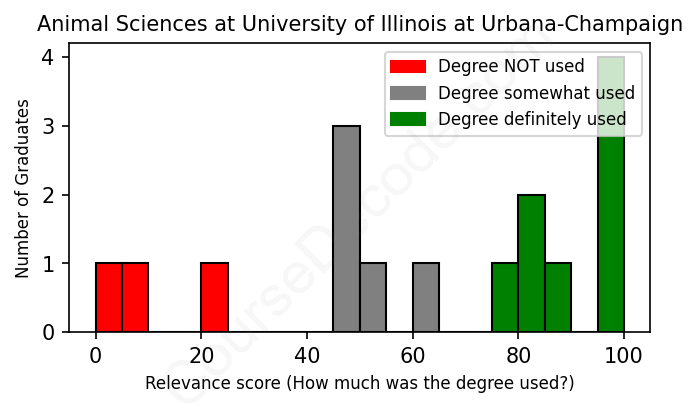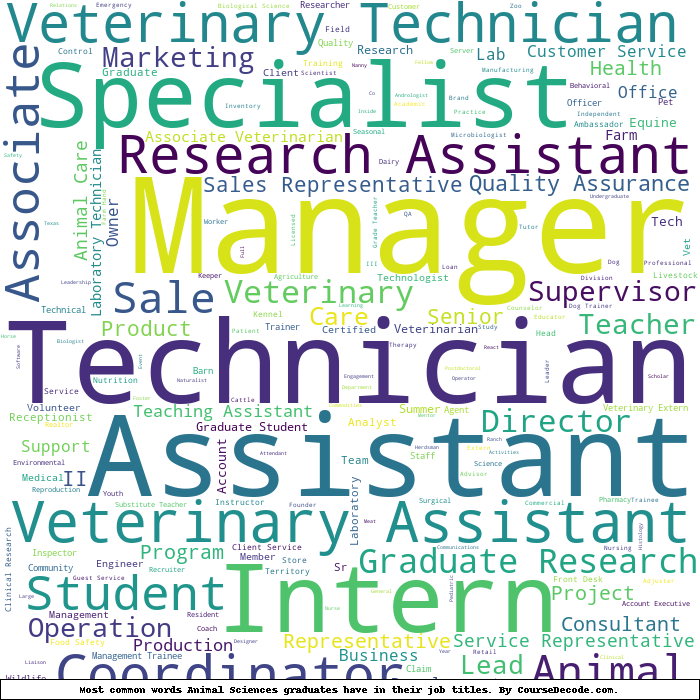
First, some facts. Of the Animal Sciences graduates from University of Illinois at Urbana-Champaign we've analyzed , here's how many have used (or NOT used) their degree in their career:

These are estimates based on AI analysis of 16 LinkedIn profiles (see below).
The verdict? Slightly below average. Overall, with an average relevance score of 63%, Animal Sciences graduates from University of Illinois at Urbana-Champaign have a slightly lower likelihood (-4%) of finding work in this field compared to the average graduate across all fields:
And for comparison, here's the chart for all profiles we've looked at across all degrees.
Also, after graduating, 56% of these graduates have pursued further education other than another Bachelor's degree (such as a Masters degree or other), compared to the average across all profiles of 35%. This suggests you may need more than just a Bachelors degree to be competitive as a Animal Sciences graduate.
See the details:
|
Relevance score: 83% We think this person has gone into a career highly relevant to their degree. We think this person has gone into a career highly relevant to their degree.
DEGREE INFOGraduated in 2015 from University of Illinois at Urbana-Champaign with a Bachelor of Science - BS in Animal Sciences. No other secondary education since. JOB HISTORY SINCE GRADUATIONCustomer Service Supervisor Waukegan Field House Jan 2016 - Apr 2016 R&D Toxicology Technician  AbbVie Apr 2016 - Apr 2022 Technical Sales Consultant  Allentown, LLC Apr 2022 - Present ABOUTExperienced Customer Service Supervisor with a demonstrated history of working in the pharmaceuticals industry. Skilled in Microsoft Excel, Customer Service, Life Sciences, Microsoft Office, and Research. Strong support professional with a Bachelor of Science - BS focused in Animal Sciences from University of Illinois at Urbana-Champaign. |
The top 10 most common jobs done by the graduates we've analyzed (ranked most common to least) are:
From analyzing the LinkedIn profiles of graduates in Animal Sciences from the University of Illinois at Urbana-Champaign, it seems that a significant number of them have pursued careers in veterinary medicine and animal care. Common job titles include roles like Associate Veterinarians, Veterinary Technicians, and Animal Care Technicians, all of which heavily rely on the principles and practical skills acquired during their studies. These positions not only utilize the technical knowledge gained in Animal Sciences but are also at the forefront of day-to-day animal welfare and health management, making them especially relevant and closely aligned with what these graduates learned in school.
However, there are also quite a few instances where graduates have taken on roles that are somewhat related but not directly focused on Animal Sciences. For instance, jobs in customer service, teaching, and administrative positions appear, which do not significantly engage the specialized knowledge acquired in Animal Sciences. While some of these roles may involve interactions with animals or general knowledge of animal behavior, they often lack the depth required or are primarily operational in nature. Overall, a good portion of the graduates seem to find their way into meaningful positions that use their education well, but it's clear that there's a mix of relevancy in the jobs they eventually choose.
Here is a visual representation of the most common words in job titles for Animal Sciences graduates (this is across all Animal Sciences graduates we've analyzed, not just those who went to University of Illinois at Urbana-Champaign):

Graduates from the Animal Sciences program at the University of Illinois at Urbana-Champaign generally start their careers in animal-related fields right after graduation. Many of them land roles like veterinary assistants, animal care technicians, or internships at various animal facilities, which helps them gain crucial hands-on experience in the industry. Over the first several years, we see a trend where many graduates move into more specialized or advanced roles, such as veterinary technicians or research positions in animal health, wildlife services, and ecological restoration. This pattern indicates a strong connection to their degree and a clear pathway into careers directly relevant to animal sciences.
As we look at what these graduates are doing 5 to 10 years post-graduation, it appears that most are still engaged in animal science-related careers. Some have advanced to positions like associate veterinarians, research coordinators, or supervisors at animal care facilities. However, there’s also a notable portion that has deviated from traditional paths and ventured into unrelated fields like education, restaurant management, or financial services. While some might argue that this diversification shows adaptability, it also reflects a possible struggle to find fulfilling positions within their primary field after graduation. Overall, many alumni seem to successfully establish themselves in the animal sciences, but there are certainly some who may not be fully utilizing their degrees in their current roles.
Alright, so a Bachelor’s degree in Animal Sciences, like the one at the University of Illinois at Urbana-Champaign, is pretty much on par with the average college degree in that it can be a mix of challenging and manageable, depending on how you handle your studies. You’ll dive into a lot of science courses—think biology, chemistry, and even some animal behavior classes. If you're really into animals and have a solid interest in science, you'll probably find it engaging, but it does require a good amount of studying and dedication. Some folks might find the lab work and hands-on experiences super exciting, while others might feel a bit overwhelmed by the coursework. Overall, I’d say it’s not the easiest degree out there, but if you’re passionate about animals, it can be really rewarding!
Most commonly, in the LinkedIn profiles we've looked at, it takes people 4 years to finish a Bachelor degree in Animal Sciences.
Based on the job histories of these Animal Sciences graduates from the University of Illinois at Urbana-Champaign, it seems like a mixed bag when it comes to making decent money. Some graduates, like those who became associate veterinarians or moved into roles as research coordinators, likely earn good salaries, especially in fields connected to veterinary medicine or animal research. On the other hand, some have taken roles that are more entry-level or part-time, like working as veterinary technicians or in customer service, which probably don’t pay as much. Overall, if you’re aiming for that high paycheck in animal sciences, targeting specific roles in veterinary or research-related positions seems like the way to go!
Here is a visual representation of the most common words seen in the "about" section of LinkedIn profiles who have a Bachelor degree in Animal Sciences (this is across all Animal Sciences graduates we've analyzed, not just those who went to University of Illinois at Urbana-Champaign). This may or may not be useful:

Here are all colleges offering a Bachelor degree in Animal Sciences (ordered by the average relevance score of their Animal Sciences graduates, best to worst) where we have analyzed at least 10 of their graduates:
| College | Score | Count |
|---|---|---|
 Purdue University Purdue University
|
80 | 14 |
 California State Polytechnic University-Pomona California State Polytechnic University-Pomona
|
78 | 13 |
 North Carolina State University North Carolina State University
|
77 | 18 |
 Iowa State University Iowa State University
|
75 | 25 |
 University of Missouri-Columbia University of Missouri-Columbia
|
75 | 12 |
 South Dakota State University South Dakota State University
|
73 | 10 |
 The Ohio State University The Ohio State University
|
71 | 21 |
 University of Florida University of Florida
|
68 | 15 |
 University of Vermont University of Vermont
|
68 | 12 |
 Michigan State University Michigan State University
|
67 | 20 |
 University of California, Davis University of California, Davis
|
66 | 27 |
 University of Illinois at Urbana-Champaign University of Illinois at Urbana-Champaign
|
63 | 16 |
 University of Tennessee, Knoxville University of Tennessee, Knoxville
|
61 | 13 |
 University of Arkansas University of Arkansas
|
60 | 10 |
 California Polytechnic State University-San Luis Obispo California Polytechnic State University-San Luis Obispo
|
59 | 22 |
 University of Wisconsin-River Falls University of Wisconsin-River Falls
|
58 | 10 |
 Texas A&M University Texas A&M University
|
54 | 34 |
 Penn State University Penn State University
|
53 | 14 |
 Texas Tech University Texas Tech University
|
51 | 12 |
 Kansas State University Kansas State University
|
51 | 22 |
 Oklahoma State University Oklahoma State University
|
43 | 16 |